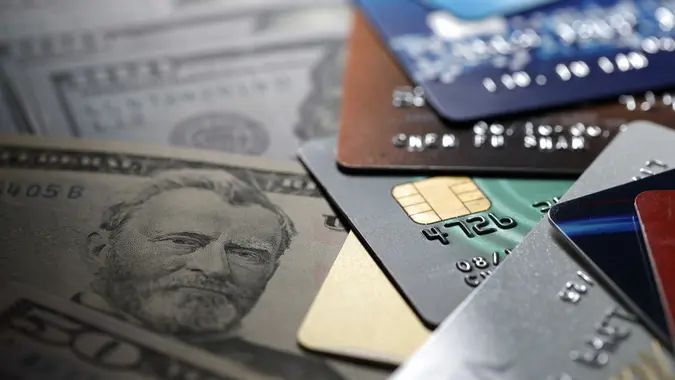The Best and Worst Day To Pay Your Credit Card Bill, According To John Liang

Commitment to Our Readers
GOBankingRates' editorial team is committed to bringing you unbiased reviews and information. We use data-driven methodologies to evaluate financial products and services - our reviews and ratings are not influenced by advertisers. You can read more about our editorial guidelines and our products and services review methodology.

20 Years
Helping You Live Richer

Reviewed
by Experts

Trusted by
Millions of Readers
Credit cards are a convenient way to make purchases — stores make it so hassle-free to save your information and with just a click of a button you buy whatever you need. But credit card companies don’t make things so easy.
Yes, they want you to use your card so you can rack up interest, but you can unknowingly drop your credit if you pay on certain days, according to financial expert John Liang. The day you choose to pay your credit card bill you could “crash your credit score.”
If you’re trying to build credit or maintain a high score, here’s what you need to know about the best and worst days to make that payment and why good credit is essential.
Factors That Impact Your Credit Score
Having good credit isn’t just necessary to get a loan. Landlords often approve tenants based on scores, interest rates are determined by your credit history and some employers will even run your numbers to see if you’re financially responsible. So, it’s a big deal to have good credit.
Here are five factors that affect your credit, according to Banner Bank.
- Payment history: Lenders like to see you pay on time. This counts for 35% of your score.
- Balance and ratio of your overall credit: The amount you owe matters. The higher the balances, the closer you get to maxing out your limit and utilization is a big deal. It accounts for 30% of your score.
- Length of credit history: This duration of your credit accounts for 15% of your score.
- Credit type: The type of loans such as auto, mortgage, student loans, credit cards, and more counts for 10% of your score.
- New credit: Any new credit card or loan counts as 10% of your score.
The Due Date Is the Wrong Day To Pay
Many people pay their credit card bills on the actual due date which seems like the right time to pay, but according to Liang, that’s the worst day to pay because of credit utilization, which is supposed to be under 30% of your limit.
Here’s why it’s vital for your credit card health.
In the video, Liang gives an example of a credit card statement that begins on January 1st and closes on Jan. 31. What you spend in that month will be due on the due date.
“And your due date typically isn’t another 24 or 25 days later,” he said. “So Jan. 1 to Jan. 31, you spend, spend, spend, spend, spend. And let’s say you spent $5,000 of a $10,000 credit limit.”
It’s important to note that the closing date isn’t the same as the due date. If you wait to pay the entire monthly balance on the due date, it can ding your credit. Why? The closing date is when the credit card companies report to the credit bureaus how much you spent.
“And so on Jan. 31, you have used $5,000 of a $10,000 credit limit, even though you don’t owe the bank a penny until the due date, which is 20 plus days later,” Liang explains.
The credit bureaus don’t know you’re going to pay the bill on the due date and to them it looks like you’re using a lot of credit, so your score gets hit.
Pay Your Bill Before the Closing Date
To avoid lowering your credit score, Liang suggests paying the majority of what you owe before the closing date.
“So, from Jan. 1 to Jan. 31, I would actually go ahead and make a payment on Jan. 27, or Jan. 28, so that my utilization is now going to be maybe 5% or 10%, which is then going to be able to boost my credit score,” Liang said. “Then on the due date I pay the rest off. There is no penalty whatsoever for early payment.”
But be sure to keep a little on your card so it shows you’re still using it, but pay the small percentage off on the due date, Liang noted.
Credit cards are a daily part of life and knowing how to use them properly will not only prevent unnecessary fees, but keep your credit score from tanking.
 Written by
Written by  Edited by
Edited by 

























